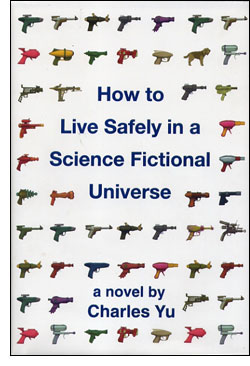Charles Yu, How to Live Safely
in a Science Fictional Universe
reviewed by Danielle L. Parker

How to Live Safely in a Science Fictional Universe Publisher: Pantheon Books, 2010 Length: 239 pp. ISBN: 978-0-307-37920-7 |
One of the signs of the vast divide between literary darling and popular appeal (or vice-versa) is wildly divergent ratings by reviewers and general readers.
And yeah, that’s exactly what we’ve got with Yu’s How to Live Safely in a Science Fictional Universe. On Amazon, the ratings tend to run either to a gushing five stars or a grim one, averaging out to a midpoint few readers actually give it. You either loved this story or you found it as boring as the back of a cereal box.
In truth, I could understand both sets of readers.
To give a short synopsis, we’ve got a time travel mechanic who’s the classic geek, flabby nerd, flinching from life, hiding out in his out-of-sync time travel machine. He can’t even manage to interact with his machine’s AI or his weird not-really-alive dog. He doesn’t call Mom, has lost his father somewhere in or out of time, and eats a lot of ramen noodles. He’s too dysfunctional to endure living in real time anymore. He tries to avoid all interactions with, well, anything. Everyone petrifies him.
So this is the story of how Yu (the protagonist is autobiographical, which means, I suppose, this whole book is its own metaphor) meets his future self, shoots himself in a fright, hunts for his daddy, and manages to start living life in the present tense. The work could be subtitled, “The Geek Grows Up,” or “The Nerd Learns to Stop Panicking,” or something like that. I think that describes the feel-good arc of this story.
And that, I think, also explains the widely divergent love-hate reaction to this story. It’s a feel-good son-grows-up tale, full of reminiscences and family history, like Amy Tan for the future. That accounts for the rave ratings.
The one stars for this book are because it’s also terminally boring. The whole book is cloaked in pseudo-scientific time travel mumbo-jumbo. Most readers will glaze over and turn the page as fast as they can (and that includes me). The narrative style is lengthy, rambling, and just what you’d expect to in the stream of consciousness of one boring, terrified, no-social-skills and no-guts geek. If you like that headset, dig in.
Maybe what a reader should do is skip to the end. Get to the feel good fast, and close the page on Happy Ever After, and sigh. Son comes to terms with past, determines to call on Mom more often, decides to look for Good Woman and have enough guts to ask her out this time. Ah! I’m tearing up already.
Copyright © 2011 by Danielle L. Parker

